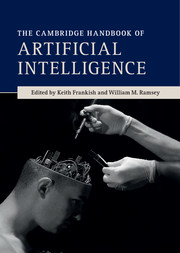Book contents
- Frontmatter
- Contents
- List of figures
- Notes on contributors
- Acknowledgments
- Introduction
- Part I Foundations
- Part II Architectures
- Part III Dimensions
- 7 Learning
- 8 Perception and computer vision
- 9 Reasoning and decision making
- 10 Language and communication
- 11 Actions and agents
- 12 Artificial emotions and machine consciousness
- Part IV Extensions
- Glossary
- Index
- References
9 - Reasoning and decision making
Published online by Cambridge University Press: 05 July 2014
- Frontmatter
- Contents
- List of figures
- Notes on contributors
- Acknowledgments
- Introduction
- Part I Foundations
- Part II Architectures
- Part III Dimensions
- 7 Learning
- 8 Perception and computer vision
- 9 Reasoning and decision making
- 10 Language and communication
- 11 Actions and agents
- 12 Artificial emotions and machine consciousness
- Part IV Extensions
- Glossary
- Index
- References
Summary
Introduction
Reasoning and decision making are fundamental parts of the Knowledge representation and reasoning (KR&R) AI approach. KR&R is devoted to the design, analysis, and implementation of inference algorithms and data structures. Work in KR&R has deep roots in reality: Reasoning problems arise naturally in many applications that interact with the world – commonsense query answering, diagnosis problem solving, planning, reasoning about knowledge in the sciences, natural language processing, and multi-agent control, to name a few. Aside from their obvious practical significance, reasoning algorithms and knowledge representations form the foundations for theoretical investigations into human-level AI.
Reasoning is the subfield of KR&R devoted to answering questions from diverse data without human intervention or help. Typically, the data is given in some formal system whose semantics is clear. In the early decades of focused research on automated reasoning and question answering (1950s onward) data was mostly akin to knowledge or our intuitions about it. More recently (from the 1980s), people assume that the data involved in reasoning are a mix of simple data and more complex data. The former take a low degree of computational complexity to process and are the focus of research on large databases (e.g., relational databases such as those recording sale transactions in businesses, accounting software for individuals, and records of stores’ items). The latter are given in a more expressive language, taking less space to represent, and correspond to both generalizations and finer-grained information.
Keywords
Information
- Type
- Chapter
- Information
- The Cambridge Handbook of Artificial Intelligence , pp. 191 - 212Publisher: Cambridge University PressPrint publication year: 2014
References
Accessibility standard: Unknown
Why this information is here
This section outlines the accessibility features of this content - including support for screen readers, full keyboard navigation and high-contrast display options. This may not be relevant for you.Accessibility Information
- 1
- Cited by
